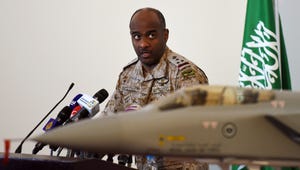SANAA, Yemen — Saudi Arabia and Egypt are considering holding large-scale military exercises after launching airstrikes on Yemeni rebels who have been slapped with a UN arms embargo and sanctions.
In a possible sign the Saudi-led air campaign against the Shiite rebels might expand into a ground operation, Cairo said it and Riyadh were mulling the drills in Saudi Arabia with other Gulf countries participating.
"It was decided to form a joint military committee to look into a large-scale strategic maneuver on Saudi territory," Egyptian President Abdel Fattah al-Sisi's office said late Tuesday after he met the Saudi defence minister.
Saudi Arabia and a coalition of Arab countries launched the airstrikes on March 26, after the Iran-backed rebels seized the capital Sanaa last year and advanced on the main southern city of Aden, where President Abedrabbo Mansour Hadi had taken refuge.
Hadi fled to Riyadh from Aden, which has since seen heavy fighting between pro- and anti-government forces, with overnight rebel attacks killing at least seven people.
Saudi Arabia has accused Tehran — the main Shiite power — of arming the rebels and the conflict has heightened tensions in the Middle East.
Iranian President Hassan Rouhani insisted that the Islamic republic is not seeking regional dominance.
His country's "ultimate goal is not Iran's domination of the region (or) the dominance of the Shiite on Sunni," he said.
"For us there is no difference between the Shiites and the Sunnis, Turks, Arabs, Persians or Baluchis," Rouhani said in a speech in the Caspian Sea city of Rasht.
In Riyadh, coalition spokesman Brig. Gen. Ahmed al-Assiri charged that "Iran has played a role in arming these militia" and must stop.
He added that the coalition has, "in a large proportion," succeeded in halting the militia's advance in the south and that its objectives "are being achieved."
Speaking in Lisbon, Iranian Foreign Minister Mohammad Javad Zarif said the "carnage" in Yemen should end, to prevent al-Qaida from benefiting.
He added that his country was prepared to use its influence to "bring everyone to the negotiating table."
World powers united against the rebels Tuesday, with the UN Security Council imposing an arms embargo on them and hitting their leaders with sanctions.
The resolution — the first formal action taken by the Security Council since the start of the air raids — demands the Huthis withdraw from Sanaa and all other areas they have seized.
Mounting Casualties
It slaps an arms embargo on Huthi leaders and their allies and puts chief Abdulmalik al-Huthi and ex-president Ali Abdullah Saleh's eldest son, Ahmed, on a sanctions list, imposing a global travel ban and an assets freeze on them.
The Huthis have allied with troops loyal to Saleh, who was forced from power in 2012 following a year of nationwide protests against his three-decade rule.
Iran has denounced the Saudi intervention as "criminal" and Tuesday proposed a ceasefire followed by foreign-mediated talks that would lead to a power-sharing government.
With civilian casualties mounting and agencies struggling to bring in aid, there have been warnings of a major humanitarian crisis in the already-impoverished country.
Residents say they are suffering from major food and water shortages, with many afraid to leave their homes for fear of being caught in the crossfire.
The World Health Organization says at least 736 people have died in the conflict since April 12 and more than 2,700 have been wounded.
Terrifying Escape
The United Nations said nearly half of the casualties were civilians and UN human rights chief Zeid Ra'ad Al Hussein called Tuesday for an investigation.
"Such a heavy civilian death toll ought to be a clear indication to all parties to this conflict that there may be serious problems in the conduct of hostilities," he said.
Thousands of foreigners have been trapped in Yemen by the violence but recent days have seen an increase in evacuations.
Rejecting claims from Yemeni-US nationals of being abandoned in the country, Washington said Tuesday hundreds of American citizens and their families had been taken to safety in nearby Djibouti.
Pakistanis who fled the fighting told AFP of terrifying dashes through war-torn areas, dodging bullets and shells to reach naval vessels evacuating foreigners.
"It was continuous shelling, continuous firing and the tanks moving on the roads. It was quite frightening for us," said teacher Saima Tanveer, who was among around 170 Pakistanis who escaped Yemen on April 3.

No comments:
Post a Comment